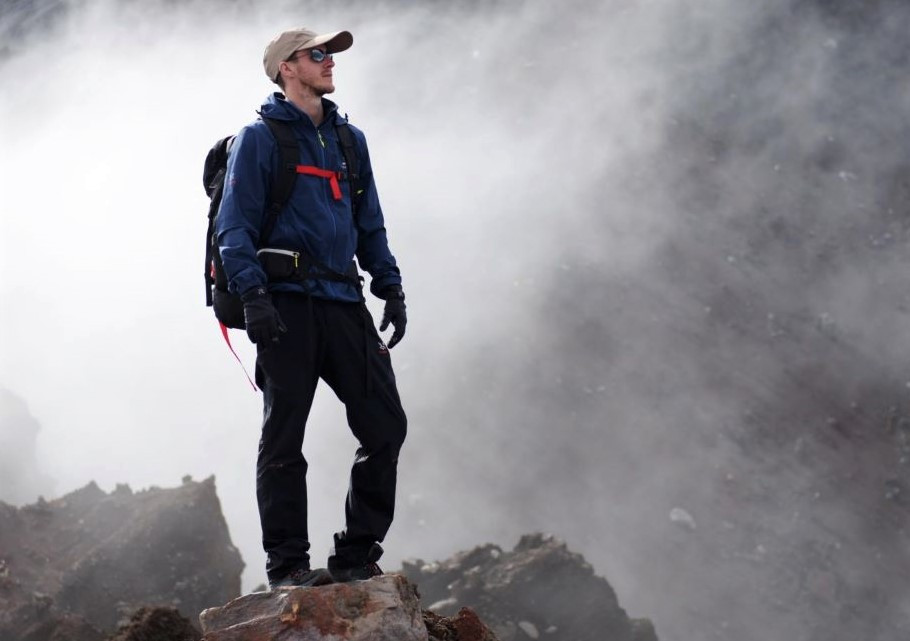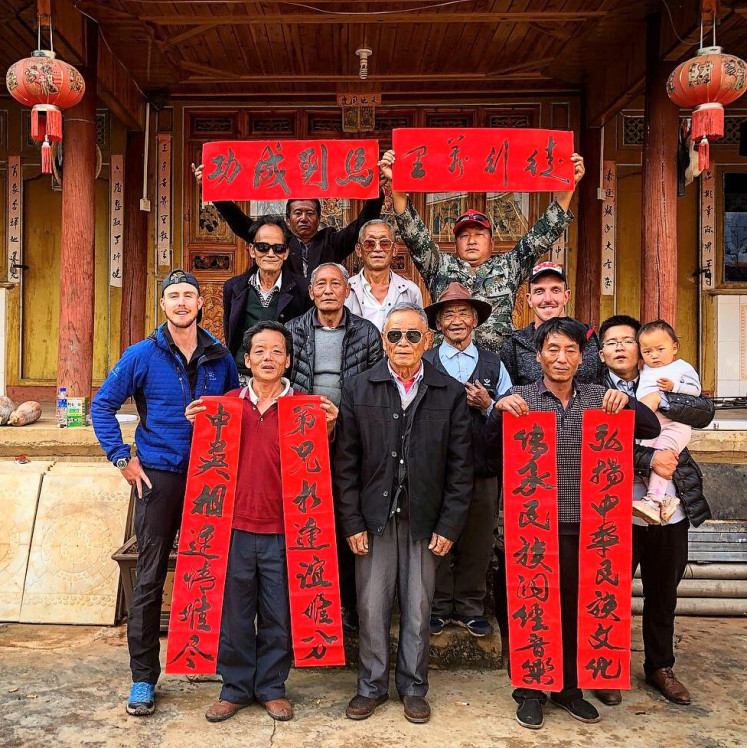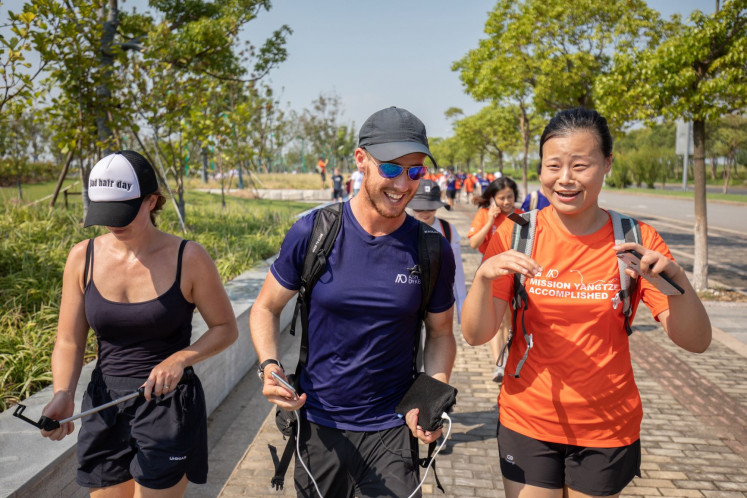Popular Reads
Top Results
Can't find what you're looking for?
View all search resultsPopular Reads
Top Results
Can't find what you're looking for?
View all search resultsAsh Dykes: An explorer for the contemporary age
Extreme athlete and explorer Ash Dykes reflects on his latest adventure, a 6,437-kilometer trek along China’s Yangtze River, in new documentary series available on the National Geographic channel.
Change text size
Gift Premium Articles
to Anyone
W
elsh explorer Ash Dykes finished his 352-day expedition trekking along China’s Yangtze River, traversing 6,437 km on foot, on Aug. 12, 2019.
Over a year later, his two-part documentary series Walking the Yangtze with Ash Dykes premiered on National Geographic Asia.
The rigorous journey brought him into the wilderness, climbing through the towering mountains of China, as well as confrontations with bears and stalked by a pack of wolves.
However, these daunting, near-death experiences are not something new to Dykes.
The 29-year-old previously trekked along Mongolia and Madagascar, making his Yangtze journey his third world-first record.
“There’s been so many amazing lessons learned, difficult ones as well,” he said during an online interview with The Jakarta Post.
“With Mongolia, [it was facing dehydration in] the Gobi Desert, with Madagascar, it was being held at gunpoint, it was hacking through the jungle, hunting [and] gathering, it was catching malaria, it was crossing crocodile-infested rivers, being bitten by leeches and spiders.”
Cultural trip: Dykes (left) encounters many villages and towns along the way, experiencing the diverse cultures along the Yangtze River, China (Courtesy of National Geographic/-)With his two first records completed before he turned 25, Dykes started his career in adventuring early on. Growing up in Old Colwyn, North Wales, the explorer first realized his preference and aptitude for kinesthetic learning after graduating from his local high school and going through an outdoor education course.
“I’m no good at sitting still in the classroom and listening to the teacher. For me, I wanted to get out into the big wide world, learn about myself. Learn about the beautiful planet we live on, learn from the different people I’d be meeting along the way, testing myself in certain dangerous and reckless scenarios” he said.
“There’s no dark story that’s led me into doing these challenges. [It started organically from when] I was 16 or 17, I was planning to travel.”
Determined to fund his goal and achieve his dreams, he toiled monthly for 240 hours as a lifeguard. After amassing sufficient funds and planning out his journeys, Dykes embarked upon his first “reckless” adventures.
“I was cycling across Vietnam and Cambodia, I crossed into Myanmar and learned how to survive in the jungle with a Burmese hill tribe, I was fighting […] as a Muay Thai fighter.”
Settling in Thailand as a scuba diving instructor to finance his lifestyle, he realized his love for adventure, bringing him onto his grueling record-first journeys.
The explorer cites the “law of attraction”, or the visualization of goals as a major factor in his drive and motivation.
“When I woke up at 4 a.m. in the morning, the first thing that I would see was this world map that I put on my bedroom wall. It was the route that I wanted to go, it was photos of different destinations that I wanted to visit, and it was lots of quotes at the bottom of the map to help keep me motivated.”
Beyond this, he described one of the times his mindset has helped save his life while facing fatigue and dehydration in the Gobi Desert during his Mongolian trek.
“Weeks went by, I was hallucinating, I was becoming delirious, I could almost feel my organs drying up […] and I remember resting under my trailer and realizing if I don’t keep getting up and pushing on, I’m gonna die out here in the Gobi Desert.”
Pulling a 120 kilogram trailer behind him in 40 degree Celsius heat while only having four days to get to a water source, Dykes used the power of visualization.
“While I couldn’t visualize four days, I broke it down, and I visualized 100 meters. I could see 100 m [ahead], so I told myself there’s no reason why I can’t rest for five minutes under my trailer, get up […] and walk for 100 m.”
During such expeditions, the challenges manifest themselves in both physical and mental strain, he believes, explaining that “[the challenges are] 30 percent physical and 10 percent mental”.
Popular: Ash Dykes (center) gains celebrity status, with many fans joining his trek and all the way to the end of his journey. (Courtesy of National Geographic/-)Dykes agrees that physical strength is mandatory in completing such adventures, which is especially important in situations such as being followed by wild animals, or hiking up mountains during his Yangtze mission.
However, the mindset, the “can-do attitude” of withstanding unforeseeable challenges and harsh conditions is extremely important, a lack of which has made many of his companions leave early on during his journey.
“You look at social media, and you think, ‘oh wow, what a pretty photo’ […] and it doesn’t really capture how hardcore the elements are […] So, I think when people were joining me, they were joining me with that mindset, like ‘oh it looks fun on his Instagram, it looks enjoyable’, and they would be hit by the harsh reality of ‘actually, this isn’t as fun as it looks on social media’.”
His travels have also aroused a sense of consciousness, as he realized the negative impacts of pollution and climate change throughout his years globetrotting.
“Since I left at age 19 – I’m 29 now – I would be learning from the locals, certain survival techniques, or I would like to get off the tourist route, off the beaten track, and go and immerse myself with the locals to learn their way of life […] I even noticed with my own eyes the difference [in how] climate change is affecting the locals […] and this has been getting worse and worse,” he recalled.
Observing the sheer extremity of the problem, Dykes took to humanitarianism.
“I thought to myself, doing what I’m doing, instead of just taking on these adventures for the love of it, maybe I can tie it in with a key responsibility, something that is close to my heart and actually raise awareness of these issues that very few people may know about.”
Raising money for the Red Cross during his Mongolian expedition, as well as collaborating with Malaria No More UK, the World Wildlife Foundation, Yibin Fishery Department and the British Consulate General amongst other groups, the explorer’s endeavors include pushing for awareness of climate change and the importance of biodiversity conservation.
Due to the pandemic, Dykes’ travel plans have been halted, but he remains optimistic about the future.
“[My] future plan is to keep doing this, keep going, keep building. I believe I’m only just getting started,” he said. “There’s a big career in this, and I’ve got some major plans to continue doing what I love doing, continue to provide help, spread awareness […] and expand, grow, hit more places, and continue to develop in this direction.”
For those wishing to follow in his footsteps, he offers a word of advice: “Don’t change yourself, just be you keep following your dream, keep following your passion and instead of chasing things, you will find that organically things will start coming to you. Keep being good at what you do or be a master in what your passion is, and the right things will surround themselves and come to you”. (ste)
-- The writer is an intern at The Jakarta Post













